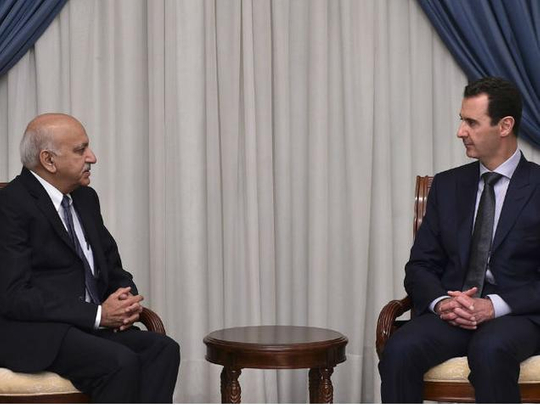
Beirut: Days after a high-profile Chinese general visited Damascus, the Indian Minister of State for Foreign Affairs M.J. Akbar showed up in the Syrian capital, where he was received by President Bashar Al Assad.
Although vocal in their support for Al Assad, member states of the BRICS group of countries have never been closer to Damascus — something that can be attributed to the direct Russian intervention in the Syria war since last September. BRICS stands for Brazil, Russia, India, China and South Africa.
India and Syria, whose embassies never closed since start of the Syrian conflict in 2011, have now agreed to upgrade security consultation and to jumpstart economic projects on-hold for five years.
Damascus has agreed to provide names of Indian citizens involved with terrorist organisations fighting in the Syrian north, notably Jaish Al Mujahideen Wa Al Ansar and the so-called Islamic State, or Daesh.
A major attack was carried out by Daesh in neighbouring Bangladesh last July that led to the killing of 28 citizens, including an Indian national. This sent alarm bells ringing in New Delhi about the need to do more in the global war on terrorism, before Daesh strikes in the heart of India. Their prime concern is Shafi Armar, also known as Yousuf Al Hindi, the main Daesh recruiter in India who has been hunting young Muslim teens and sending them to the battles of Aleppo.
After meeting the Indian minister, Al Assad said: “India has a role to play in meeting the challenge of terrorism” while Akbar noted that so much destruction in Syria was now going to pave the ground for “an era of re-construction”.
India and Syria revisited a bundle of pending development projects, all signed before the current conflict, including a $320 million power plant project, overseen by Bharat Heavy Electricals Ltd (BHEL) and completion of a steel plant in the ancient city of Hama on the Orontes River. The Indian minister promised to complete both projects, and Syria promised to facilitate construction and guaranteed safety of Indian nationals and firms operating in Syria. The last Indian business delegation to visit Syria was back in 2014. The two sides also discussed an invitation extended to Indian Foreign Minister Sushma Swaraj to visit Damascus in the last quarter of 2016.
The high-profile Indian official signals growing courage among the BRICS grouping to engage with Damascus, breaking a five year international embargo on meeting and dealing with Syrian officialdom. The Chinese General who arrived in Syria last week sought intelligence cooperation on Chinese terrorists in Syria and offered the Syrians a donation of shields and ambulances. This opening only started after the Russian Army joined the Syrian battlefield last September.
Four months later Syrian Foreign Minister Walid Mua’alem visited India where he met with Prime Minister Narendra Modi and secured $1 million in medical aid from the Indian government.
Months before outbreak of the Syrian Conflict, then-Indian president Pratiba Patil visited Damascus, reciprocating a visit by her Syrian counterpart in June 2008. She was the last head of state from the BRICS organisation to visit the Syrian capital.












